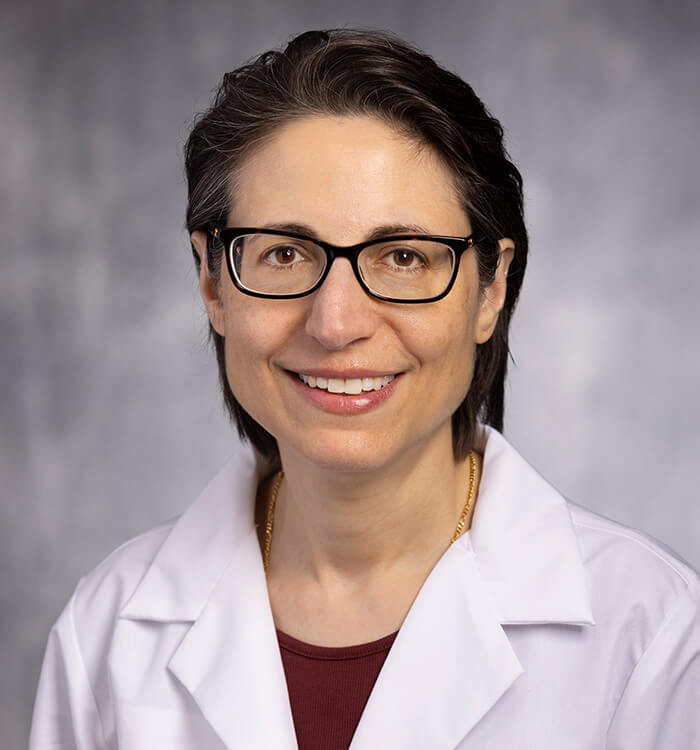UH Neurological Institute Welcomes Pre-eminent Neurosurgeon Sepideh Amin-Hanjani, MD
November 21, 2022
Innovations in Neurology & Neurosrugery | Fall 2022
“There is a well-established cohesiveness of culture within the UH Neurological Institute,” says Sepideh Amin-Hanjani, MD. “Dr. Bambakidis leads by example with foresight and openness to continually expand the excellent work happening here.”
 Sepideh Amin-Hanjani, MD
Sepideh Amin-Hanjani, MDThis summer, the University Hospitals Neurological Institute named Dr. Amin-Hanjani Director of Cerebrovascular and Skull Base Surgery and Vice-Chair of the Department of Neurological Surgery. A pre-eminent neurosurgeon, she holds the Warren R. Selman Endowed Chair of Neurological Surgery at University Hospitals Cleveland Medical Center.
“We are fortunate to welcome a neurosurgeon of Dr. Amin-Hanjani’s prominence to University Hospitals,” says Nicholas C. Bambakidis, MD, Chair of the Department of Neurological Surgery, Vice President and Director of University Hospitals Neurological Institute, and the Harvey Huntington Brown Jr. Chair in Neurosurgery at Case Western Reserve University School of Medicine. “Lauded for her surgical skill, she is also transforming thinking around cerebral blood flow and stroke prevention.”
A Diplomate of the American Board of Neurological Surgery since 2004, Dr. Amin-Hanjani is an elected member of the Society of Neurological Surgeons, the American Academy of Neurological Surgery and Society of University Neurosurgeons, and a Fellow of the American Heart Association and American College of Surgeons. She is a graduate of Harvard Medical School and completed her neurosurgery residency at Massachusetts General Hospital in Boston prior to a Cerebrovascular and Skull Base fellowship at the Barrow Neurological Institute in Phoenix.
Dr. Amin-Hanjani comes to Cleveland from the University of Illinois Chicago, where she was a tenured professor and had held the positions of Co-Director of Neurovascular Surgery and Residency Program Director. With a clinical focus on treating cerebrovascular disease and skull base pathology, she has spent the past 20 years honing her microsurgical skills to repair aneurysms and other vascular abnormalities of the brain. Internationally renowned for her work to advance cerebral bypass surgery, she was also principal investigator of the National Institutes of Health (NIH)-funded VERiTAS study, a multisite international study of blood flow in cerebrovascular occlusive disease.
Dr. Amin-Hanjani is actively involved with the NIH StrokeNet consortium, a national stroke trials network. Her clinical research focus involves flow measurement technology that uses MRI to quantitate milliliters per minute of blood flow in intracranial vessels. “Through StrokeNet, our group has been funded to study a subgroup of patients with intracranial stenosis using this imaging to help predict who is at particularly high risk of stroke,” she says.
Her hope is that blood flow imaging can serve as a biomarker that identifies patients who are at high risk due to impaired flow as candidates for stroke-preventing interventions. “People come in with symptoms or a prior small stroke. We put them on appropriate medical therapy and encourage them to improve lifestyle factors, but if they have flow impairment, that doesn’t fix the underlying problem,” says Dr. Amin-Hanjani. “We hypothesize that if we can identify people early on, we can address blood flow and reduce future stroke risk.”
Ongoing Research Initiatives
The author of over 200 publications and 30 book chapters, Dr. Amin-Hanjani brings a vast body of research interests to University Hospitals. One proposal she is pursuing involves submaximal angioplasty, an endovascular procedure to treat intracranial stenosis that does not carry the same risks as intracranial stenting.
“It is a gentler way to achieve normal blood flow,” she says. “We’re trying to open the blood vessel just enough to improve blood flow, but not so much that you risk injuring the vessel or disrupting the plaque to cause a stroke.”
She has also been collaborating on a study of aneurysm tissue that she hopes will lead to novel treatments. “My goal is to continue that research here at University Hospitals because we have a large aneurysm population.”
Part of what drew Dr. Amin-Hanjani to Northeast Ohio is a robust research infrastructure, including grant, methodology and statistical resources at University Hospitals and Case Western Reserve University School of Medicine. “What is critical here at the UH Neurological Institute is the clinical trials unit, which enables physician-scientists to implement research with the highest standards,” she says.
Some of Dr. Amin-Hanjani’s unique research and clinical interest involves the study of rare vascular diseases. She is currently involved in writing a scientific statement for the American Heart and Stroke Associations about Moyamoya disease, a disorder caused by progressive blockage of intracranial blood vessels that is a cause of strokes in young adults. She also actively participates in a large national consortium studying dural arteriovenous fistulas, abnormal connections between arteries and veins.
In her new role at University Hospitals, she hopes to collaborate with colleagues to expand minimally invasive open and endoscopic neurosurgical approaches. “Over the past decade, I’ve developed the practice of performing keyhole surgeries, which minimize any trauma to the brain and result in faster recovery times,” she says, “That is an opportunity for my skill set to add to the comprehensive scope of care we offer.”
For more information, contact Dr. Amin-Hanjani at Sepideh.Hanjani@UHhospitals.org.
Contributing Experts:
Sepideh Amin-Hanjani, MD
Director of Cerebrovascular and Skull Base Surgery
Warren R. Selman Endowed Chair of Neurological Surgery
University Hospitals Cleveland Medical Center
Vice-Chair of the Department of Neurological Surgery
Case Western Reserve University School of Medicine
Nicholas C. Bambakidis, MD
Vice President and Director
University Hospitals Neurological Institute
Professor
Harvey Huntington Brown, Jr. Chair in Neurosurgery
Case Western Reserve University School of Medicine


